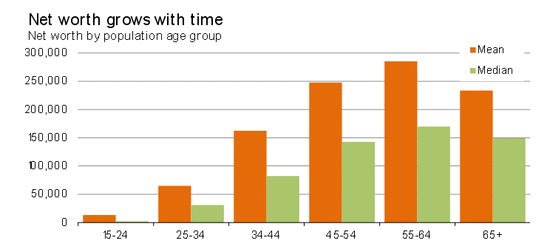
By Mieke Welvaert*

Inheritance has long existed as a power-transferring mechanism for the few and an intergenerational social security blanket for the masses.
However, increased longevity has altered the mechanics of inheritance, stretching the system across more than one generation.
As a result, the inheritance cycle may not be as socially advantageous as it once was.
This article proposes that, even if inheritance no longer serves the same purpose, we have developed alternative practices of providing intergenerational support.
Furthermore, and regardless of whether it is needed, the tendency of people to build wealth over their lifetimes suggests that inheritance is inevitable.
For the purposes of this article, inheritance will be addressed as the transfer of one’s wealth to nominees (usually children and close relatives) upon one’s death.
When viewed across generations, inheritance is an effective way to smooth net worth[1] out over a lifecycle.
According to data from the Survey of Family, Income, and Employment (SoFIE), average net worth increases over a lifetime, peaking when people hit their late 50’s, but remaining elevated throughout retirement years.
For a long time, society has used inheritance to spread this wealth progression out along life cycles by allocating our leftover wealth to the next (younger) generation, when we die.

Source: Wealth Disparities in New Zealand, 2003/03 SoFIE data
However, with people living longer, this cycle of wealth-smoothing is changing.
An old lecturer of mine said that ‘back in his day’ the generation before you tended to die at around the same time that you had young kids and a mortgage.
At this point, inheritance money (or assets) can be incredibly useful as it is one of the most expensive periods of your life, and also a time when you haven’t yet accumulated much in the way of net worth.
This was indeed the case for those in my grandparent’s generation who were likely to be in their late thirties when their parents died. However, the age of a child at the time of a parent’s death quickly shifted to the mid-forties for my parent’s generation and myself.
Even if our longevity flatlines at 80, the generation after me will probably be 50 at around the time that I die.
Living longer is a sign of better health and well-being, and this is a good thing. However, it does distort the inheritance cycle as a wealth-smoothing and intergenerational support system.
The cycle has stretched to the extent that the children of my generation will be near the peak of their wealth cycle when inheritance funds would come through.
People have responded to this change in a number of ways.
Within families, inheritances are split amongst the next two generations or are directed only to the younger “more in need” of the two.
Some families focus more on securing the next generations welfare while they are still alive, such as contributing towards a child’s deposit on their first home.
A recent survey from the United States suggests that almost 60% of parents provide financial support to their adult children[2]. Having said this, there will be some who, still persist in giving money after their death even though they know that their children will be at a peak in their wealth cycle at this time.
If you want to pass your wealth to your next of kin, why is it important to do so after your death? The answer to this lies in our reasons for having wealth in the first place.
At its core, inheritance is the result of the human tendency to accumulate wealth and we do this for a number of reasons:
- to protect one’s independence and power – meaning that you can avoid the pitfalls of financial desperation such as taking on loans you can’t afford, or being coerced into work you don’t want to do.
- as a precautionary measure – so as to pay for unexpected car and home repairs or medical bills.
- “to increase one’s future income” with the purpose of enhancing our future ability to consume. This is especially the case for those that wish to retire with more than just the national superannuation to lean on.
The uncertainty of the exact timing of our death means that when we die, some of this wealth is usually left over.
The ‘left overs’ can be a result of having planned to live longer or the intention to give someone financial support from beyond the grave, but it generally comes about because we tend to keep owning things right until the point of our death.
As a result, inheritance is a method by which we can safeguard ourselves during life, but also designate the left over wealth to a cause we deem worthwhile (support of a spouse or children for example) when we can no longer use it ourselves.
-------------------------------------------------------------------
[1] Total assets minus total liabilities
-------------------------------------------------------------------
Mieke Welvaert is a data analyst at Infometrics. You can contact her here »
11 Comments
Interesting article that applies to me as well. Am about to hit the age of 48 and still have both parents, both sitting on properties now worth a total of over $1.5M and am considering semi retiring next year because financially I now can with my mortgage paid off. When they pass its instant retirement for me, however its earlier in life you need the money and not later as you get out of debt far sooner and are able to accumulate that wealth earlier without giving such a large proportion to the banks in interest. Things howerver are just getting worse for the next generation and not better, they are likely to inherit a morgage their parents never finished paying.
"they are likely to inherit a morgage their parents never finished paying."
From my viewpoint/perspective, I suspect more than you realise.
Personally with all the negatives in the future I think we'll see a 75% drop in house prices. The Q then will be is there any point in continuing paying off the parents debt instead just let it default as there will be no value remaining to make it worthwhile to do so unless compelled legally.
Interesting thing on the collapse of house prices in Latvia its seems that families were/are doing the "honourable" thing and paying back the debt even with huge negative equity. The bwankers in Sweden etc must be laughing their heads off.
regards
plus all the other issues, climate change, peak oil/minerals, decades of debt to pay off as a PAYE, burden of x2 the OAPS etc etc.
Frankly I think they are buggered.
regards
Never going to happen.
Paying the mortgage if the house prices drop 75% is going to be the lest of your problems, the country will have already disintegrated into total anarchy.
We are not Latvia and any international crisis is just going to result in a massive influx of people trying to get back into New Zealland as a safe haven. If all the kiwi ex-pats tried to come home at once we would be in serious housing trouble and the prices would double overnight.
No its just steady as we go until obviously at some point in the future with the current worldwide population growth, life on this planet as we know it now is going to end, its inevitable and just a question of when. My pick is 40-50 years which is why the current policy makers and population in general just don't care, they are not going to be here to whitness the end.
My advice, enjoy it while you can. I don't blame the younger generations these days who just party party all the time, you have to see it from their point of view.
Not going to happen? and just how is that prevented? on your knees prayer?
Did we see massive anarchy from the first great depression? um no.
Sure I can see kiwis trying to come home, to not a lot. The expectation that while not paying NZ tax as they have lived overseas for years if not decades that now they get govn funded handouts?
House prices double again? really? who can afford to pay that? so sure the few with money/cash can but when they come to sell no one will be able to pay what they paid, hence yes 75% losses.
Sure we are not latvia, so kiwis will simply default when its obvious there will be no profit and get declared bankrupt, maybe debtor prisons will return? a nice bit of cheap slave labour?
Looks a great future.
"my advice" yes if you are amoral I guess. I'd like to do a lot better and we can.
regards
Gen Y are going to inherit far more than any generation in history, in terms of infrastructure and their parents wealth; so they should stop moaning about their student loans
Um, rubbish.
Well except for inheriting massive public and private debt, scarcity of affordable energy, minerals and food. Oh and the expectations of their parents they will be looked after in old age....pigs might fly.
Also many Gen Y dont have "rich" well off parents. On top of that, the "wealth" is based on assets that only have the significant value they do in an oil abundant grow for ever economy. maybe you have oticed to 15~30+% youth un-emloyment in some countries right now?
Reality they will inherit worn out infrastructure (as it has a finite life), probably it will be wrong sized, in the wrong place and even of the wrong type to be of significant use yetthe debt to put it there will still be owed. Think oil refineries yet oil is gone by 2050. Think why so many roads are planned today bythe Nats when ppl wont be driving as much in 20 years time at most.
regards
If the parents were so well off - they would have paid for their children's tertiary education. Why do you think the kids had to borrow money in the first place?
It's likely a defence many parents of children with student debt use - as it serves to shelter them from reality - the reality that they never had enough additional income to allow them to save for the kids higher education. But yeah, your point makes it all somehow more acceptable to burden youth with debt before they even know how to balance a budget.
Correct nzcoollie. I could have put my children through university however I think it would have sent them the wrong message. Instead they uplifted loans which would have been their problem if they flunked out. They both graduated and then I paid them off when the government gave you the 10 per cent bonus. I know kids who were supported by mummy and daddy who secretly took up loans to use for trips etc. A no brainer to take up loans especially when you have paid more than your fair share of tax.
I see purchasing power dropping by 75%. I think they (the central bankers) will just keep inflating until the system cracks. The USD will then be replaced by world money (the SDR) and inflation through credit creation will be allowed to continue. As resources dwindle people will just become more impoverished through loss of purchasing power. No wonder people are rushing to buy as many hard assets as they can get.

We welcome your comments below. If you are not already registered, please register to comment
Remember we welcome robust, respectful and insightful debate. We don't welcome abusive or defamatory comments and will de-register those repeatedly making such comments. Our current comment policy is here.